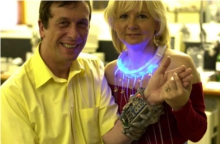A magazine where the digital world meets the real world.
On the web
- Home
- Browse by date
- Browse by topic
- Enter the maze
- Follow our blog
- Follow us on Twitter
- Resources for teachers
- Subscribe
In print
What is cs4fn?
- About us
- Contact us
- Partners
- Privacy and cookies
- Copyright and contributions
- Links to other fun sites
- Complete our questionnaire, give us feedback
Search:
Cyborg Super Senses
Could humans ever gain super-human powers. Could the blind see with the help of computers? This is the stuff of science fiction comics and films - like Dr Octopus and the X-men or Geordi La Forge from Star Trek who could see using implants in his temples.

Our senses are not great compared to other animals. Peregrine falcons can see small prey up to 5 miles away. Polar bears can smell a seal from similar distances. Many animals have senses we do not possess at all, like bats which can sense in ultrasound.
Inventing tools to improve our senses is almost a defining feature of being human. After all that is all that a pair of glasses does. Computer technology can even let us "see" things other than light. Radio telescopes, for example, let us see distant galaxies and the combination of the Internet and spy satellite technology allows everyone to look down from space on any street in the world.
All of this technology is disconnected though. It doesn't really give us superhuman senses any more than sitting in a tank gives us armour plated skin. The technology turns the signals into something our limited abilities can sense. We then just use our eyes or ears as normal.
Neuroscientists increasingly understand how our brains and nervous system, the brain's communication system to the rest of the body, works. Signals from our eyes or finger tips pass down our nerves to the brain which turns them into understanding of the world around. Similarly the brain sends messages out down the nerves to control our movements. Our brains are very adaptable, though. Where the messages come from originally or ultimately go to doesn't matter too much to the brain...and as they are basically just electrical signals computer technology can both detect them and recreate them.
This leads to intriguing questions. What would be possible if we linked computers directly to the nervous system or even the human brain. Can we cure disabilities? Could we have super-human senses? Could we sense in ultrasound like a bat and what would it actually feel like? If the computers were linked to the Internet, could it literally take our senses further: outside our bodies altogether. Is any of this even remotely possible?
This all sounds like science fiction but it has already happened. They are the kinds of question Cybernetics Professor, Kevin Warwick of Reading University is interested in...and he actually turned himself into the world's first cyborg to find out the answers.
A team of neuroscientists implanted a chip directly into the nerves of his arm. It sensed the electrochemical signals travelling along his arm from his brain and transmitted them to a computer. The computer could also send signals to the implant that then travelled along the nerves of his arm to his brain as would the sense signals when he touched something.
By connecting the computer to an ultrasound detector, with the signals from it being sent via the implant to his brain, he could literally feel objects moving towards him even when blindfolded. His brain learnt to interpret the signals from the ultrasound. He really had gained a completely new sense.
The implant was also connected to the Internet. For example, a robot arm copied his arm movements by sensing the signals between his brain and his hand as he flexed his fingers ...even though he was in New York and the robotic hand in England.

What does it feel like? According to Kevin:
A student made a light necklace for his wife, Irena, to wear. When he was relaxed the necklace sensed this via the implant over the Internet and was a cool blue. When he was excited however, his wife would know as her necklace glowed red as a result...even when she was in London and he was still in Reading. When she later had probes inserted into her arm, she didn't need to watch the necklace she could directly feel the signals from his arm and vice versa, allowing them to communicate directly nervous system to nervous system.

Kevin is excited as to where this could lead:
The next step is to place implants not in the arm but directly in the brain. The use of brain implants is actually already quite widespread to help people with Parkinson's disease live a normal life again. What hasn't been done is to connect brain implants to the internet and so connect human's brains directly together. That raises even more amazing questions that were previously only the realm of science fiction and pseudoscience. Can more advanced forms of this technology make "telepathy" a reality? Could a human directly sense the thoughts of another, and if so what would it be like?
We could soon know.



